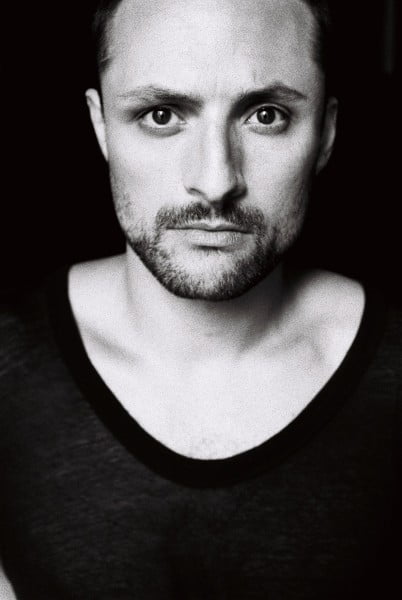 “I’m one of the bad guys, right? Or I used to be? Obviously the bankers are to blame for a lot of the economic problems a lot of big companies have. The whole economic crash; a lot of it was fuelled on greed.”
“I’m one of the bad guys, right? Or I used to be? Obviously the bankers are to blame for a lot of the economic problems a lot of big companies have. The whole economic crash; a lot of it was fuelled on greed.”
Sitting in a Kreuzberg bar in Berlin on a cool spring afternoon Spectral Records label boss Ryan Elliot laughs loudly (and ironically) as he reminisces about his previous life working in Detroit for giant car corporation Ford.
Chatting about his life as a highly paid corporate executive to Resident Advisor in 2006 he spoke happily about enjoying his job’s ‘routine and job security’ though four years on he’s relocated to Berlin to concentrate 100% on music.
“When I first started working at Ford (at the end of the 90s) it was still the good times then we went through job cuts five, six or seven times,” he recalls.
“I was in the finance department, I was a financial analyst, and I saw the group that I worked in go from 50 people down to ten down to five.
“I didn’t loose my job, I left the company at the end of September before moving here to Berlin, I was lucky enough not to lose it. I also wanted to pursue this path, of the music, to give it a serious try.”
Key to his new solo musical career is minimal uber-producer Matthew Dear who as well as recruiting Ryan as his understudy/ warm-up DJ in 2003 more recently has given him full control of Ghostly spin-off label Spectral.
Branding the label as Ghostly’s ‘leaner, meaner brother’, Ryan’s kick-starting its marketing with his own unmixed label compilation CD, marking Spectral’s ten year anniversary (titled ‘Document; compiled by Ryan Elliot’).
document; out in May
“One of the things I love about dance music is how fast it changes and even though our label is very well established as a US house and techno label, we always go through phases and we’re in a new phase now,” he enthuses.
“We have new artists coming through and we wanted a comp to say ‘here’s where we are, right now’.
Document mixes and matches post-minimal ‘deep’ Berlin-style house tracks from established Spectral artists including Audion and James T Cotton alongside cuts from relative newcomers including Seth Troxler and Kate Simko.
“To me what’s really hot at the moment is the lo-fi underground Berlin house sound,” he continues. “One of the things I aim to be as a DJ, is to be ahead of the curve and I’ve been liking this kind of music for a while. What I find myself DJing at the moment is either techno records or house records but not too much in between. i.e. not so much tech-house or minimal. So it’s techno mixed together with house but really polarised.”
Skrufff (Jonty Skrufff): You spent almost all of the last decade working a corporate office job, alongside building your DJ career at weekends, where did the DJing side of your life begin?
Ryan Elliot: “A lot of people start DJing when they’re in their teens bit I didn’t actually start DJing until I came home from University. I lived my whole life in Detroit but I went to university at a small town called Kalamazoo which is half way between Detroit and Chicago. I got a bachelors degree in economics and finance then I came back home and started working for one of the big car companies in Detroit. It was only then that I started discovering club culture. First I remember liking the music, then thinking ‘what’s that guy in the booth doing’, then ‘what equipment is that guy in the booth using?’
My roommates and I got into it that way, we didn’t have any DJ friends; we just liked to go out clubbing. My roommates convinced me to buy a set of turntables, I fell in love with DJing and I’m still in love with it. CDJs, needles . . I’ve been infatuated ever since then. The very first time I touched a turntable was Christmas Eve 1999, which really isn’t that long ago. It’s been a gradual progression since then.”
Ryan spinning @ DEMF, Detroit 2008 (click on the picture for a Youtube clip)
Skrufff: How did you go from bedroom DJ to playing out in clubs?
Ryan Elliot: “For the first couple of years I practised as much as I could and bought all the records and then in 2003 I met Matthew Dear and we started a club night together in Ann Arbor, that’s when it all really took off. By that point he was a fairly well established producer and to be frank, I’d get booked with him, because they wanted him as the headliner and somebody from the label to open up. I always tried to make an impression on the promoters that booked me with Matthew, so they would maybe book me to come back alone the next time if Matthew couldn’t make it. That’s how I came up, with and under Matthew, supporting him.”
Skrufff: Many clubbers party hardest during their university years, what stopped you from clubbing then, what kind of student were you?
Ryan Elliot: “I was a student-student. I did really well at university but only because all I did was study. I didn’t really party at all, I didn’t drink, I hadn’t really been exposed to clubbing. Some of Richie Hawtin’s first Plastikman parties were going on around me then and I’d like to be able to say that I took part in those but I didn’t, I didn’t even know they were happening at the time. I grew up about half an hour outside Detroit in a smaller town and I didn’t know then that party scene existed.”
Skrufff: Was there a group of fellow students who were going raving?
Ryan Elliot: “No, on-one at all from my school was. Otherwise I think I would have got into it. Only when I got home to Detroit and started going to a big club called Motor, did I get into it.”
Skrufff: You chatted to Resident Advisor in 2006 about appreciating the job security in your finance job at Ford, presumably you lost all that security over the last two years?
Ryan Elliot: “Ford actually is one of the few companies that is still around, though the others, are too, to a certain extent. The US government is bailing out GM, and Chrysler in reality almost doesn’t exist, while Ford is the only one that’s stood on its own two feet. I’m not biased towards the company, though. We used to call the auto industry in the States the ‘Big Three’, Ford, Chrysler and GM and they made their money from selling bigger cars and trucks while Toyota was busy making their money from selling smaller cars. When gas (petrol) prices in the US started fluctuating it decimated the Big Three. And on top of that, the labour work force that builds these cars are in unions where their salaries are really inflated and on top of that these companies are so old that they have so many retirees they have to pay benefits too. All these effects combined and over the last ten years the companies were decimated.”
Skrufff: How much have you had to switch mindset from being a financial analyst to living uncertain life of a musician?
Ryan Elliot: “Of course. You try and save up money beforehand and now there’s no guaranteed paycheck but that’s OK, I wanted to try this. You only get one chance at life. I wasn’t happy doing what I was doing before whereas DJing is my passion. I need to give this a go, otherwise I’m sure I’d think back in the future and think ‘what if?’ “
Skrufff; What did you financial colleagues think as your DJ career started thriving?
Ryan Elliot: “Well you know what? They didn’t really know that I did it (laughing). You’re only one Google search away right, but no-one made that search and they had no idea for a long time. Towards the end of my time at Ford when I told a few of my friends . . . not friends, close co-workers that I knew, they were really supportive and they thought that it was neat. Because a lot of those guys, and girls, I worked with, have families and their jobs and their houses and they’re happy with their job, but they can also see the other side. Maybe they want to live a little vicariously through someone that they know and like and they want to see him take that chance.”
Skrufff; Did you encounter any hostility?
Ryan Elliot: “No, not really, no.”
Skrufff: Is it true that houses are now selling in downtown Detroit for one US dollar?
Ryan Elliot: “Yes. My whole life I’ve grown up with abandoned skyscrapers, it seems normal to me, but you never see that in London not even here in Berlin anymore. The reason they’re selling houses for one dollar is because there are whole neighbourhoods that are abandoned and they just want someone to come in and to be a presence and to fix those places up.”
Skrufff: Were you living in downtown Detroit?
Ryan Elliot: “No, no, never, I always lived in the suburbs. But we would always do parties downtown and go to the clubs down there. There are also a few restaurants down there that are good.”
Skrufff: Did you get any antagonism from clubbers or DJs seeing you as a finance guy?
Ryan Elliot: “No it was never an issue because the Detroit community is pretty close-knit, they knew me, they knew my heart and how much I loved DJing and they saw me out every week, at the shows, whether I was DJing or not and also at the record stores. It wasn’t like I was trying to be something I wasn’t.”
Skrufff: You’re still not producing much, why not?
Ryan Elliot: “I am a little, I’ve done a few remixes and a couple of tracks but that’s all so far. Now that I’m here in Berlin I plan to do more. Before I’d be working 50 or 60 hours a week at my finance job then DJing at the weekends, there simply wasn’t enough time. It’s a gradual step from DJing.”
Skrufff: How ambitious are you? Do you want to be as big as Richie Hawtin? Or bigger?
Ryan Elliot: “Yeah. I think I play really good music and I want as many people in the world as possible to hear it. I think I do it just as good as anybody else, if not better and I want to be driven.”
Document; compiled by Ryan Elliot, is released on Spectral Sound on May 10.
http://ghostly.com (‘The Music for Creatives compilation is a joint effort between longtime admirers Ghostly International and Behance. Its release coincides with The 99% Conference, Behance’s yearly summit on creativity and productivity . . .’)
Ghostly recommended site 99%: click HERE: ‘At 99%, Behance’s think tank, we focus on what happens after inspiration—researching the forces that truly push ideas forward. Our profiles of proven idea makers, action-oriented tips, best-practices sessions, and annual conference are all designed to help you transform ideas from vision to reality . . .’)





